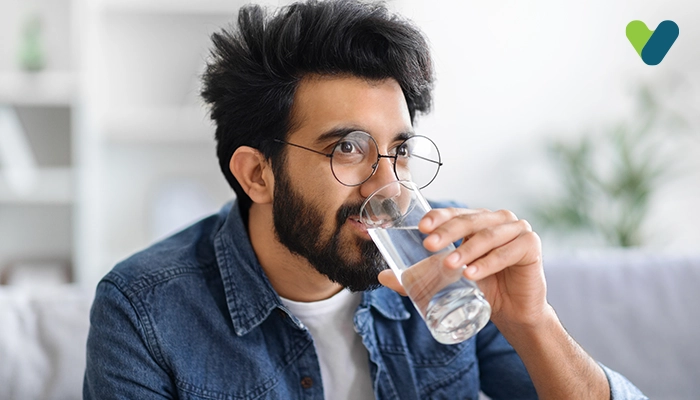How much water to drink a day? This is a question that has been long debated by scientists and experts without any clear answer. Studies have always differed on how much water to drink a day and the core take-away is that there is no universal formula available in this aspect. It all depends on individual needs, i.e., how much fluid the body requires. Still wondering how much water should you drink a day? Here’s trying to solve the puzzle!
Top 4 Health Benefits of Drinking Water
Before getting into how many litres of water to drink a day, know more about the health benefits of water. Water comprises 50-70% of body weight, being indispensable for our existence and life. Every body organ requires water for proper functioning. We need both air and water to live. Here are some of the other benefits that you should be aware of:- Water flushes out waste materials through sweating, bowel movements and urination.
- Water maintains normal body temperatures.
- It safeguards sensitive and vulnerable body tissues.
- It keeps the joints lubricated.
Low daily water intake can lead to dehydration and subsequent complications. Even milder forms of dehydration may lead to low energy and fatigue.
How much water you should drink in a day?
Now comes the big question- how much water to drink on a daily basis? This is important since we keep losing water regularly through sweat, urine, stools and our breath as well. We need to keep drinking water throughout the day in order to fill up this gap and replenish the levels of water in the body. So, how much water should an adult drink daily? As per the U.S. National Academies of Sciences, Engineering, and Medicine, it should be 15.5 cups or 3.7 litres each day for men and 2.7 litres or 11.5 cups each day for women. These include the intake through food, various other beverages and normal water consumption itself. How many glasses of water to drink in a day? We have been told from childhood to drink eight glasses of water each day. It is an achievable and practical target that we can meet on a daily basis.4 Factors That Affecting Water Consumption
1. Physical Activities and Workouts
If you are working out regularly, playing a sport, engaging in physical activity and other labor, then you may have to drink more water to fill up the gap.2. Living in Hot and Higher Regions
Extra fluids may also be needed if you reside in predominantly humid and hot areas. Higher altitudes may also lead to dehydration.3. Health Conditions like Diarrhea
Fever, diarrhea, vomiting and other minor conditions lead to high fluid loss. This is why doctors prescribe ORS at these times. Any other disease/infection may also require higher consumption of water.4. Pregnancy or Breastfeeding
If you are breastfeeding or pregnant, you may require more fluids for proper hydration.Of course, you can fulfill fluid requirements not only with water but other beverages as well. If you consume fruits like watermelons or vegetables like spinach, then you can expect higher daily intake.
Beverages like teas, milk, juices, etc. may also help. You can also count on some caffeine and sodas. However, consume sweetened beverages in limited amounts.
Are You Drinking Enough Water Daily?
You are possibly consuming sufficient fluid if you do not feel thirsty all the time, your urine is light yellow or colorless. The dietician and doctor will help you work out the quantity of water that is suitable for you on a daily basis. You should drink a glass with every meal and also between meals and also during, before or after working out. You should also drink water when you are thirsty.Drinking excessive water is not always an issue for healthy adults. Athletes or those who work out may sometimes drink excessive water to keep dehydration at bay. Excessive water may lead to the kidneys facing issues in tackling the same. This may lead to hyponatremia which means dilution of sodium in the blood and it can be fatal. However, this is a rare condition.


